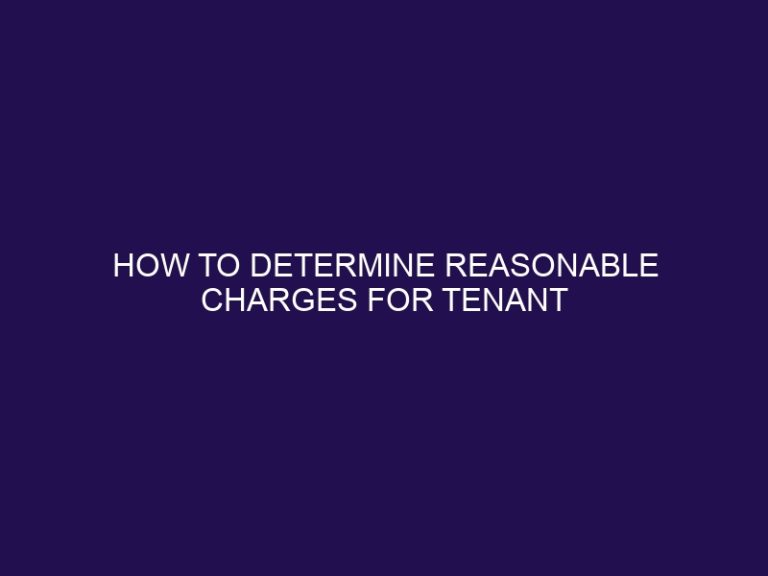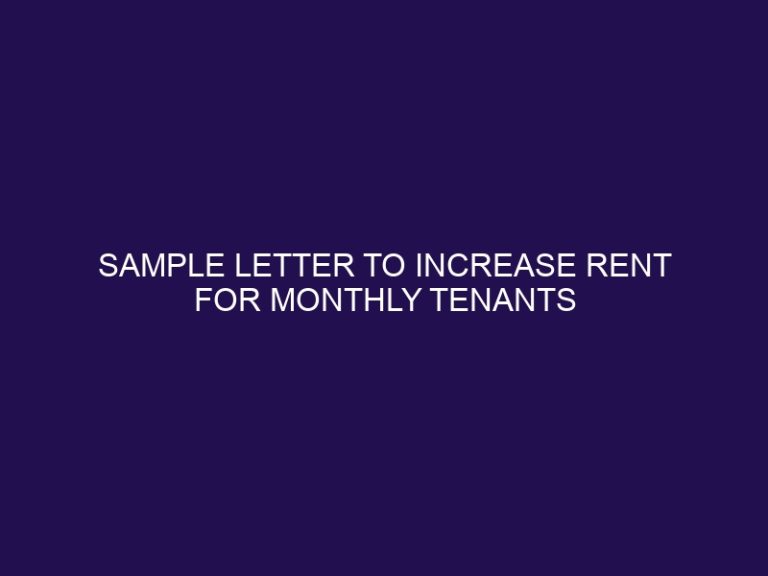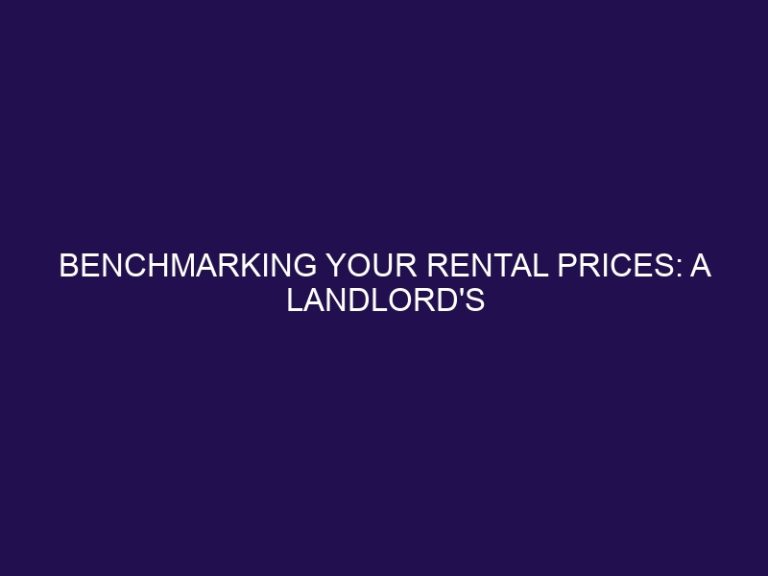Maximizing Your Lease Agreement: Insider Tips for a Winning Contract
In the world of landlord-tenant relationships, a well-crafted lease agreement is the cornerstone of a successful and harmonious partnership. From mitigating legal risks to defining payment terms and outlining maintenance responsibilities, a written lease serves as a crucial tool for both landlords and tenants.
In this comprehensive guide, we will delve into the importance of a written lease, addressing changes in landlord-tenant law, effective tenant screening processes, and crafting a comprehensive pet and subletting policy. We’ll also explore the significance of outlining additional fees, delineating tenant and landlord obligations, and specifying conditions for property access. Whether you’re a seasoned property owner or a new landlord, this article will equip you with the knowledge and strategies needed to create a legally sound lease agreement that protects both parties’ rights and interests.
Key Takeaways:
The Importance of a Written Lease
A written lease agreement is a pivotal component of the landlord-tenant relationship, providing a legally binding document that outlines the rights and obligations of both parties in the rental property.
By explicitly detailing the terms and conditions, a written lease minimizes the potential for misunderstandings or disputes, thus fostering a harmonious rental ecosystem. From delineating rent amount and due dates to outlining maintenance responsibilities, a well-crafted lease acts as a safeguard for both landlords and tenants.
In cases of contentious issues or breach of contract, the lease serves as an essential legal foundation for pursuing remedies.
As such, seeking counsel from legal experts or property management companies can be invaluable for drafting a comprehensive and legally sound lease agreement. These professionals can provide guidance on local tenancy laws, best practices for incorporating clauses that protect landlord rights, and ensuring the document aligns with legal standards.
Mitigating Legal Risk with Clarity
Clarity within the lease agreement is essential for mitigating legal risks and safeguarding the rights of both landlord and tenant, underscoring the need for precise and comprehensive documentation in the rental process.
When the terms and conditions of a lease are unclear or ambiguous, it can lead to disputes and legal complications. A clear and well-defined lease agreement not only protects the landlord’s rights, but also provides a secure framework for the tenant.
Legal experts, such as attorneys specializing in real estate law, play a crucial role in ensuring that the lease agreement is legally sound and enforceable. Their expertise in drafting and reviewing contracts can help eliminate potential loopholes and ambiguities, providing a solid foundation for the rental relationship.
Changes in Landlord-Tenant Law
Staying abreast of changes in landlord-tenant law is crucial for landlords and tenants alike, ensuring compliance with evolving legal standards and preempting potential disputes that may necessitate court hearings or legal intervention.
The dynamic nature of landlord-tenant law calls for vigilant attention to legal nuances. Legal experts play a pivotal role in navigating these changes, offering invaluable guidance to landlords and tenants.
It is imperative for lease agreements to reflect current legal requirements to avoid potential conflicts. An awareness of the implications of legal changes is vital for both parties, safeguarding their rights and obligations under the law.
Defining Payment Terms and Security Deposits
Defining clear payment terms and establishing security deposit protocols are fundamental aspects of the rental agreement, underpinning the financial aspects of the tenancy and safeguarding against potential breaches that may involve law enforcement or financial penalties.
Precise payment terms provide clarity on the amount, frequency, and method of payments, reducing the likelihood of misunderstandings and financial disputes. Security deposit regulations, often delineating the amount held, conditions for deductions, and timelines for return, play a crucial role in protecting the landlord’s property and mitigating potential damages.
Rental application verifications, including credit checks, rental history, and employment verification, help ensure the reliability of the tenant, reducing the risk of financial irregularities and breaches of the agreement. In cases of severe breaches, involving non-payment or property damage, law enforcement may be enlisted to enforce eviction or pursue legal action, underscoring the importance of meticulously defining and adhering to these terms.
Screening Prospective Tenants Effectively
Effectively screening prospective tenants is vital for establishing a secure and harmonious landlord-tenant relationship, involving thorough rental application assessments, credit checks, and potential collaboration with property managers to ensure diligent vetting processes.
By meticulously scrutinizing rental applications, landlords can gauge candidates’ financial stability, rental history, and references, laying a solid foundation for a positive tenancy. Credit check protocols play a pivotal role in verifying the applicants’ creditworthiness, helping landlords make informed decisions and minimize the risk of potential income loss or property damage. Property managers, with their expertise and experience, can assist in streamlining the screening process, offering valuable insights and resources to enhance the overall vetting efficiency and accuracy.
Background and Credit Checks
Conducting thorough background and credit checks as part of tenant screening procedures is crucial for real estate investors and property owners, ensuring informed rental decisions and mitigating financial risks associated with inadequate tenant assessments.
By incorporating these screening measures, property owners can significantly reduce the likelihood of encountering issues such as non-payment of rent, property damage, or lease violations. This proactive approach reinforces a secure and stable rental environment, contributing to long-term tenant satisfaction and positive landlord-tenant relationships.
It underscores the importance of due diligence in safeguarding investments and promoting responsible tenancy, ultimately yielding greater peace of mind for real estate investors.
Application Process and References
The application process and obtaining references play a pivotal role in tenant screening, necessitating comprehensive assessments and potential collaboration with property management groups to gather informative references that contribute to informed rental decisions.
Property management groups are often involved in the tenant screening process to verify prospective tenants’ qualifications and gather essential references. Thorough assessments of these references, which may encompass previous rental histories, employment records, and creditworthiness, are crucial for informed rental evaluations. The reliability and accuracy of the gathered references can significantly impact the property owner’s decision-making process, highlighting the necessity for a meticulous and detailed approach to obtaining and assessing references.”
Crafting a Comprehensive Pet and Subletting Policy
Crafting a comprehensive pet and subletting policy within the lease agreement is essential for establishing clear guidelines and regulations, potentially involving the expertise of property management companies to address the complexities of managing pet-related and subletting aspects.
Such policies provide a framework for landlords and tenants to understand their rights and responsibilities concerning pets and subletting. Property management companies can play a crucial role in ensuring that these policies are comprehensive and compliant with legal requirements. They can assist in drafting language that clearly outlines the rules for pet ownership, including any breed restrictions, weight limits, and pet deposits or fees.
Property management companies can help mitigate the potential risks associated with subletting by clearly defining the process for obtaining landlord approval and outlining the terms and conditions that subtenants must adhere to. This involvement can help streamline the management of pet and subletting-related issues, ultimately promoting a harmonious living environment for all parties involved.
Outlining Additional Fees and Maintenance Responsibilities
Comprehensively outlining additional fees and maintenance responsibilities in the rental agreement is critical for transparency and avoiding hidden costs, potentially necessitating the collaboration of property managers to address maintenance aspects and financial implications.
Failure to clearly define these elements can lead to misunderstandings and disputes between landlords and tenants. The role of property managers in negotiating and overseeing maintenance activities can ensure that the property is well-maintained without unexpected financial burdens. Including a detailed breakdown of fees such as utilities, maintenance, and potential penalties can help establish clarity and accountability for both parties. Adequate communication and transparency in the rental agreement about these aspects can contribute to a more harmonious landlord-tenant relationship.
Hidden Costs and Rental Unit Care
Understanding hidden costs and rental unit care is integral for landlords and tenants to ensure proactive maintenance responsibilities and financial clarity within the rental agreement, emphasizing the potential involvement of property management groups in addressing these aspects.
When hidden costs are left unaddressed, they can lead to misunderstandings and disputes between landlords and tenants, potentially affecting the overall satisfaction of both parties. By acknowledging these costs upfront and embedding them into the rental agreement, it creates a transparent and fair environment for all involved.
Property management groups can play a crucial role in promoting transparency by meticulously outlining these costs and ensuring that the rental unit care responsibilities are clearly communicated to all parties.
Consequences for Lease Violations
Establishing clear consequences for lease violations is essential for maintaining the integrity of the rental agreement, potentially involving the expertise of property management companies to navigate the eviction process and enforce financial penalties when necessary.
The defined consequences serve as a deterrent for tenants, emphasizing the importance of adhering to the terms outlined in the lease agreement. Consistency in enforcing these consequences fosters an environment of respect for the property and its rules, ultimately contributing to a harmonious and well-maintained community.
Property management companies play a crucial role in this process by ensuring that all steps involved in addressing lease violations are handled effectively and in compliance with legal requirements.
Legally Sound Lease Agreements
Drafting legally sound lease agreements is paramount for ensuring enforceability and clarity, potentially requiring the guidance of legal experts, such as attorneys or services like LegalZoom, to navigate the intricate legal frameworks and safeguard the rights of both parties.
Crafting a legally sound lease agreement involves meticulously outlining the terms and conditions, addressing potential contingencies, and ensuring compliance with relevant laws and regulations. With the potential complexities and nuances involved, seeking professional assistance can contribute to comprehensive coverage of legal considerations within the lease agreement.
By enlisting the support of legal experts, clarity and precision can be achieved, minimizing ambiguities and mitigating the risk of disputes or legal hurdles. This partnership can also aid in recognizing and safeguarding the rights and obligations of both the landlord and the tenant.
Consulting Legal Experts for Protection
Consulting legal experts, including attorneys in Chicago, can provide crucial protection and guidance in navigating the complexities of lease agreements, ensuring legal compliance, and safeguarding the interests of landlords and tenants.
Attorneys play a pivotal role in drafting and reviewing lease agreements to ensure that they align with the relevant legislation and protect the rights of all parties involved. Their expertise encompasses addressing potential disputes, outlining clear terms and conditions, and ensuring fair and lawful clauses.
Legal experts possess the knowledge to advise on state-specific regulations and local ordinances, offering invaluable insights to landlords and tenants on their rights and obligations.
Delineating Tenant and Landlord Obligations
Delineating clear tenant obligations and landlord rights within the lease agreement is crucial for establishing mutual responsibilities, mitigating legal risks, and fostering a transparent and harmonious landlord-tenant relationship.
When both parties have a solid understanding of their roles and rights, it helps prevent potential disputes by setting clear expectations from the outset. Defining these obligations not only fosters transparency but also helps in maintaining a harmonious relationship throughout the tenancy period. It safeguards both the landlord and tenant from potential legal conflicts and ensures that each party upholds their end of the agreement.
Specifying Conditions for Property Access
Specifying conditions for property access within the lease agreement is essential for establishing boundaries, respecting tenant privacy, and potentially necessitating collaboration with property management companies to facilitate seamless access procedures that uphold the landlord-tenant relationship.
Establishing specific guidelines for property access in the lease agreement is crucial to ensure that both the landlord and tenant are aware of the protocols and expectations regarding entry into the rented premises. By clearly outlining the permissible circumstances for entry, it not only provides a framework for respecting tenant privacy but also helps prevent misunderstandings and conflicts.
Involving property management companies in this process can contribute to the smooth implementation of access procedures, fostering a positive and cooperative relationship between landlords and tenants.
Conclusion
In conclusion, prioritizing a well-crafted lease agreement is pivotal for mitigating legal risks, fostering a balanced landlord-tenant relationship, and ensuring the effective management of rental properties, underscoring its role as a cornerstone of sound property management practices.
A well-crafted lease agreement serves as a critical tool that outlines the rights and responsibilities of both landlords and tenants. It sets clear terms for rent payments, property maintenance, and any potential disputes, thereby minimizing misunderstandings and conflicts. By clearly defining the obligations of both parties, it promotes transparency and trust within the landlord-tenant relationship.
A comprehensive lease agreement helps protect the interests of landlords by specifying provisions related to property usage, occupancy limits, and maintenance responsibilities. This not only safeguards the property but also provides a legal framework for addressing any violations or breaches.
From a broader perspective, a well-drafted lease agreement plays a pivotal role in the effective management of rental properties by establishing protocols for rent adjustments, lease renewals, and property inspections. It provides a framework for addressing issues such as property damage, security deposits, and lease terminations, contributing to efficient rental property administration.
FAQ
Explore commonly asked questions regarding lease agreements, landlord-tenant law, and the dynamics of rental property management, providing insightful answers and guidance related to written lease agreements and legal considerations.
One of the frequent queries related to lease agreements is the duration of the lease. Many tenants and landlords wonder about the differences between a fixed-term lease and a month-to-month lease, and the implications of each option. It’s important to understand the legal aspects and potential consequences of the chosen lease term.
Questions often arise about the rights and responsibilities of both parties, such as the maintenance and repair obligations, subletting, and eviction procedures. Regarding landlord-tenant law, there is a need for clear understanding regarding security deposits, rent increases, entry to the rental property, and the tenant’s privacy rights. Exploring these aspects can help in preventing disputes and ensuring a harmonious landlord-tenant relationship.
Rental property management involves concerns about lease renewal, property maintenance, and legal compliance with housing regulations, all of which are crucial for the smooth functioning of rental properties.
Source Links
Access a curated collection of authoritative source links covering diverse aspects of lease agreements, landlord-tenant law, rental property management, and expert insights from legal professionals and property management entities.
These valuable resources offer in-depth analysis of the legal intricacies involved in lease agreements, effective strategies for property management, and comprehensive guidelines for both landlords and tenants to navigate the complexities of landlord-tenant law.
Expert insights from respected legal professionals provide an invaluable perspective on the legal nuances and potential pitfalls in lease agreements and rental property management. Practical advice on mitigating disputes and ensuring compliance with landlord-tenant laws is highlighted, offering a well-rounded perspective for individuals involved in rental property arrangements.
FAQs
Find detailed answers to frequently asked questions related to lease agreements, landlord rights, tenant obligations, and the mitigation of legal risks, providing valuable insights and clarity on essential aspects of the landlord-tenant relationship.
Understanding the legal intricacies of lease agreements is vital for both landlords and tenants. When entering into a lease agreement, it is crucial to comprehend the rights and responsibilities of each party involved. As a landlord, being well-versed in your rights enables you to manage your properties effectively and create a harmonious tenancy. Simultaneously, tenants benefit from understanding their obligations to ensure compliance and a smooth leasing experience. Implementing strategies to mitigate legal risks is essential to safeguard all parties involved from potential disputes or complications.
Related Articles
Discover an array of related articles covering diverse topics such as lease agreements, effective tenant screening practices, pet policies, the eviction process, and guidance from legal experts, offering valuable perspectives and advice for landlords and property managers.
Understanding the nuances of lease agreements is critical for both landlords and tenants to ensure a smooth and transparent rental experience. Effective tenant screening practices are essential to select reliable and responsible tenants, safeguarding the property and minimizing potential issues.
Implementing clear and fair pet policies is a delicate balance between accommodating pet owners and ensuring the well-being of all tenants and the property. The eviction process can be complex, and legal guidance from experts can help navigate potential pitfalls and challenges.
For landlords and property managers, the insights provided in these articles aim to enhance their knowledge and decision-making, contributing to a harmonious and mutually beneficial landlord-tenant relationship.
Frequently Asked Questions
What are some key tips for creating a winning lease agreement?
Some important tips to keep in mind while creating a winning lease agreement include clearly outlining all terms and conditions, including necessary clauses for rent, security deposit, and maintenance responsibilities, clearly defining the length of the lease, and using plain language to avoid any confusion or misunderstandings.
What are some common mistakes to avoid when drafting a lease agreement?
Some common mistakes to avoid when drafting a lease agreement include using vague or ambiguous language, not including necessary clauses, such as pet policies or noise restrictions, not specifying the consequences for violating the lease, and not including important details, such as move-in/move-out procedures or parking arrangements.
How can I ensure that my lease agreement is legally binding?
To ensure that your lease agreement is legally binding, it is important to use correct legal terminology, follow state and local laws, have all parties involved sign the agreement, and have a witness present during the signing. It is also a good idea to have a lawyer review the agreement before finalizing it.
What are some tips for negotiating a lease agreement?
Some tips for negotiating a lease agreement include researching the local rental market to determine fair prices, being open to compromise, clearly stating your needs and concerns, and being willing to walk away if the terms are not favorable.
How can I protect myself from potential disputes or issues with a lease agreement?
To protect yourself from potential disputes or issues with a lease agreement, be sure to clearly outline all terms and conditions, keep detailed records of any communication or agreements made, and have a clear plan in place for handling any disputes or issues that may arise.
What are some additional resources for creating a winning lease agreement?
Some additional resources for creating a winning lease agreement include consulting with a real estate lawyer, using online templates or software specifically designed for lease agreements, and researching the laws and regulations in your local area.







